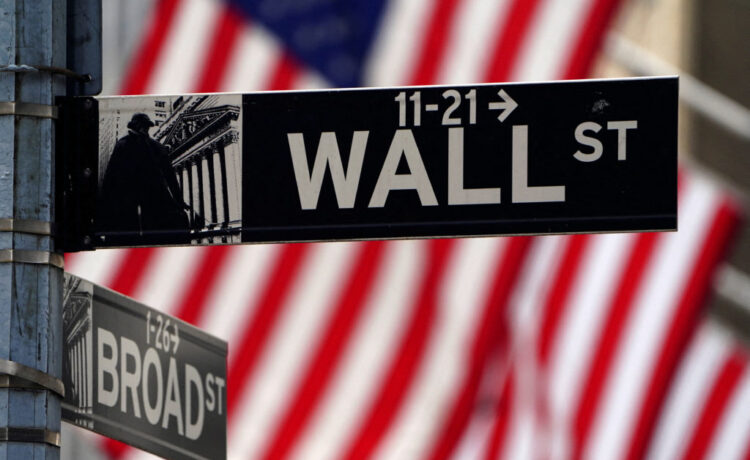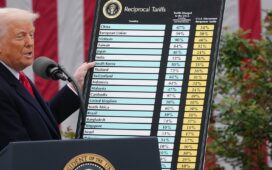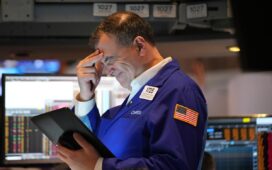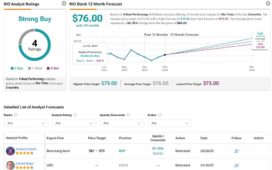NEW YORK (AP) — U.S. stocks are swinging again Wednesday in the final hours before President Donald Trump unveils the tariffs he promised as part of his “ Liberation Day ” that could drastically remake the global economy and trade.
The S&P 500 was flat in morning trading after roaring back from an early loss of 1.1 percent. It’s had a pattern this week of opening with sharp drops only to finish the day higher. The Dow Jones Industrial Average was up 28 points, or 0.1 percent, after erasing an initial drop of 360 points. The Nasdaq composite was 0.1 percent lower, as of 10:35 a.m. Eastern time.
Financial markets around the world have been particularly shaky lately because of all the uncertainty around what Trump will announce in the event scheduled to begin after the U.S. stock market closes for the day. He has said he wants tariffs to make the global system more fair and to bring manufacturing jobs back to the United States from other countries.
But tariffs also threaten to grind down growth for the U.S. and other economies around the world, while worsening inflation when it seems to be remaining stubbornly higher than the Federal Reserve’s 2 percent target. Much is still unknown about what Trump will say, including how big the tariffs will be, which countries will be hit and what kinds of products will be targeted.
The announcement may also not even clear up all the uncertainty weighing on Wall Street, given that it may just provide a starting point for negotiations with other countries.
One of the hopes that’s helped push upward on the U.S. stock market recently is the possibility that at least the worst of the uncertainty may have already passed.
“We do not know how long the previously enacted tariffs and any future tariffs will remain in force, but we believe peak tariff uncertainty may soon be behind us,” according to Kurt Reiman, head of fixed income Americas, and other strategists at UBS Global Wealth Management. “Much of the work the administration set out to achieve will have been put in place, and there are numerous potential offramps available.”
READ MORE: Trump plans to launch more tariffs on April 2. Here’s what it could mean for you
The tariffs Trump will unveil later in the day will follow other announcements of 25 percent tariffs on auto imports; levies against China, Canada and Mexico; and expanded tariffs on steel and aluminum. Trump has also put tariffs against countries that import oil from Venezuela and plans separate import taxes on pharmaceutical drugs, lumber, copper and computer chips.
Another fear hitting the market is that the herky-jerky rollout of his trade strategy may itself create enough nervousness to spur U.S. households and businesses to freeze their spending, which would damage the economy.
Surveys have shown deepening pessimism, but economists are waiting to see if that translates into actual damage for the economy. A report on Wednesday morning suggested the U.S. job market may still be running stronger than expected.
The report from ADP Research said employers, excluding the government, accelerated their hiring last month by more than economists estimated. It could be an encouraging signal for the more comprehensive jobs report coming Friday from the U.S. government. Economists expect that to show overall hiring slowed in March from February.
The job market has been one of the linchpins keeping the U.S. economy out of a recession.
Treasury yields nevertheless fell after the ADP payrolls report, continuing a trend that’s largely held since January on worries about how tariffs could slow the economy.
The yield on the 10-year Treasury fell to 4.14 percent from 4.17 percent late Tuesday and from roughly 4.80 percent early this year. That’s a significant move for the bond market.
On Wall Street, Tesla weighed on the market after it said it delivered fewer electric vehicles in the first three months of the year than it did in last year’s first quarter. Its shares fell 3 percent to extend their loss for the year so far to 35.5 percent.
Tesla, one of Wall Street’s most influential stocks because of its immense size, has faced growing backlash due to anger about CEO Elon Musk’s leading the U.S. government’s efforts to cut spending.
Newsmax fell 47.9 percent in its third day of trading to give back some of its meteoric gains from its debut. It surged 735 percent Monday and then another 179 percent on Tuesday.
On the winning side were several airlines, which recovered some of the sharp losses they’ve taken recently on worries that customers worried about tariffs and the global economy will fly less.
United Airlines climbed 1.4 percent to trim its loss for the week to 1.5 percent.
In stock market abroad, indexes fell across much of Europe after finishing mixed in Asia.
AP Business Writers Yuri Kageyama and Matt Ott contributed.





